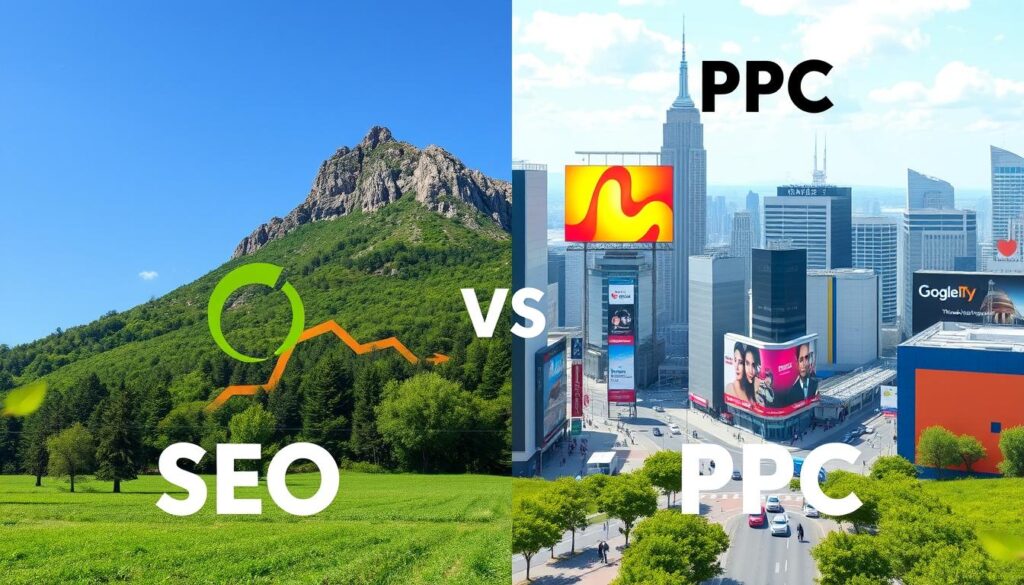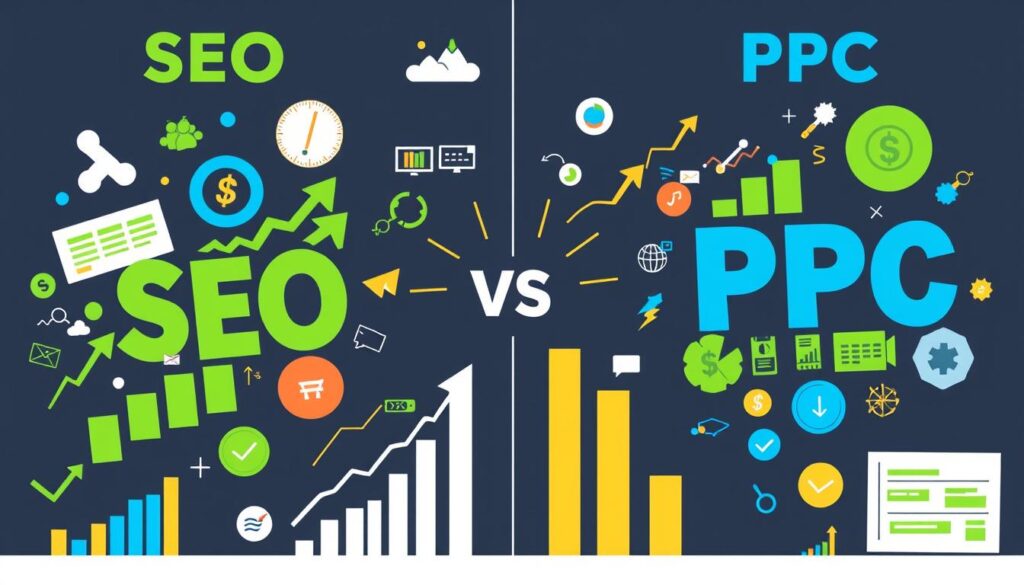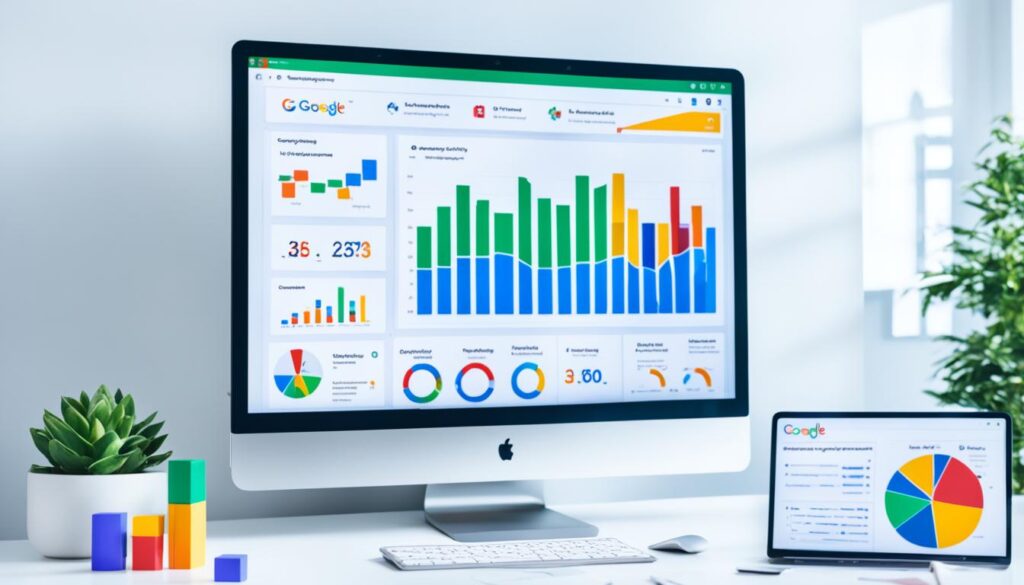In the digital marketing world, businesses often wonder which method is better. SEO (Search Engine Optimization) or PPC (Pay-Per-Click) advertising? This article will look at the good and bad of each. It aims to help you pick the best way to get the traffic you need and meet your marketing goals.
Key Takeaways
- Understand the key differences between SEO and PPC to make an informed decision
- Explore the benefits of SEO for long-term, sustainable traffic growth
- Discover the advantages of PPC for immediate results and targeted advertising
- Learn how to integrate SEO and PPC strategies for maximum impact
- Identify the factors to consider when choosing between SEO and PPC
Understanding SEO and PPC
In the digital marketing world, SEO (search engine optimization) and PPC (pay-per-click) are two key strategies. They help businesses get more online traffic. Knowing how they differ is key for businesses wanting to grow online and reach their audience well.
What is SEO?
SEO makes your website better for search engines. It uses techniques like keyword research and link building. This way, your site can show up higher in search results, helping more people find what you offer.
What is PPC?
PPC is about paid ads that show up in search results. Businesses pay to have their ads seen. They can target specific keywords to reach their audience quickly and see how well their ads do.
SEO and PPC are different but can work together well. They help businesses create a strong online marketing plan. By knowing what each does best, businesses can use both to reach their goals and be more visible online.
“Successful digital marketing requires a comprehensive strategy that integrates both SEO and PPC to achieve optimal results.”
The Benefits of SEO
Search Engine Optimization (SEO) is great for businesses wanting more website visitors. It helps your site rank higher in search results. This means more people can find what you offer when they need it.
SEO is especially good at bringing in organic traffic. This is different from ads that stop working when you stop paying. With SEO, your site keeps getting more visitors over time. This is perfect for building a strong online presence.
SEO also offers significant returns on investment (ROI). When your site is easier to find, you get more people interested in what you offer. This can lead to more sales and a stronger brand.
SEO also makes your site better for users. By making your site easier to use, you keep visitors happy. This can lead to more people staying on your site and being more satisfied with their visit.
Lastly, SEO is a long-term strategy. It keeps working for you for years. Unlike quick fixes, SEO helps you stay ahead in the digital world for a long time.
| Benefit | Description |
|---|---|
| Organic Traffic | SEO can generate a steady stream of organic, long-term traffic to your website. |
| Return on Investment (ROI) | Effective SEO can lead to significant returns on your investment through increased sales and brand awareness. |
| Enhanced User Experience | SEO optimizations can improve the overall user experience on your website, leading to higher engagement and customer satisfaction. |
| Long-Term Strategy | SEO is a sustainable, long-term strategy that can continue to deliver results for years to come. |
“SEO is not a short-term fix, but a long-term strategy that can pay dividends for years to come.”
The Advantages of PPC
Pay-Per-Click (PPC) advertising is great for getting more people to visit your website. It’s fast, unlike SEO, which takes time. With PPC, you can put ads on search engines or other websites and start getting visitors right away.
PPC also lets you target your ads well. You can choose who sees your ads based on where they are, what they like, and what they search for. This means your ads reach the people most likely to buy from you, saving you money.
- Immediate results: PPC can generate traffic and leads quickly, unlike the slower process of building organic search visibility through SEO.
- Targeted advertising: PPC allows you to precisely target your ideal customers based on factors like location, demographics, interests, and search queries.
- Measurable performance: PPC platforms provide extensive data and analytics, allowing you to track the success of your campaigns and make data-driven adjustments.
- Flexibility and control: PPC offers a high degree of flexibility, enabling you to quickly adjust your campaigns, budgets, and targeting as needed.
Using PPC’s benefits like quick results and targeted ads can help your business grow. It’s a key part of a good digital marketing plan, helping you achieve real success.
SEO vs PPC: Key Differences
SEO (Search Engine Optimization) and PPC (Pay-Per-Click) aim to bring more visitors to your site. But they go about it in different ways. Knowing these differences helps you pick the best strategy for your business.
SEO works on getting your site to show up naturally in search results. This means your site ranks higher in search engine pages through good content and optimization. This kind of traffic is seen as more valuable because it shows real interest from potential customers. On the other hand, PPC gives you quick, but possibly pricey, traffic through ads that show up at the top or sides of search results.
| Metric | SEO | PPC |
|---|---|---|
| Traffic Generation | Organic, long-term | Paid, immediate |
| Cost | Requires ongoing investment in content and optimization | Pay per click, with potential for high costs |
| Control | Indirect control over ranking factors | Direct control over ad placement and targeting |
| Measurability | Harder to attribute specific conversions to SEO efforts | Easier to track individual ad performance and ROI |
SEO and PPC also differ in control and how easy it is to measure results. SEO needs a roundabout way to boost rankings, focusing on content quality, site structure, and technical tweaks. In contrast, PPC lets you control ad placement and targeting more directly. This makes it easier to see how well your campaigns are doing and what they’re bringing back in return.
“The choice between SEO and PPC ultimately depends on your business goals, budget, and industry competition. A holistic approach that integrates both strategies can often yield the best results.”
Choosing between SEO and PPC should match your business needs, budget, and how competitive your industry is. Using both strategies can often lead to the best and most lasting results.
Integrating SEO and PPC for Maximum Impact
Many businesses see great results by combining their SEO and PPC strategies. This mix of synergistic strategies and data insights from both areas leads to a stronger digital marketing plan. It helps you get the most out of your efforts.
Synergistic Strategies
SEO and PPC together can create a powerful effect. You can use PPC data to pick the best keywords for your SEO. This makes sure your content is relevant and effective.
At the same time, your SEO work can boost your PPC campaigns. It can improve your ad quality and lower your costs.
Leveraging Data Insights
Looking at data from both SEO and PPC gives you important insights. You learn which keywords and content your audience likes best. You also find ways to boost your conversion rates and ROI.
| Metric | SEO | PPC |
|---|---|---|
| Click-through Rate (CTR) | 12.5% | 3.2% |
| Cost per Acquisition (CPA) | $25 | $18 |
| Return on Investment (ROI) | 18% | 22% |
By integrating SEO and PPC, you get a more complete digital marketing plan. It uses the best of both worlds to help your business succeed.
SEO vs PPC
Both search engine optimization (SEO) and pay-per-click (PPC) advertising are great for getting people to your website. But, they work in different ways. Knowing the differences helps you pick the best strategy for your business.
SEO is about getting your site to rank better over time. This means more targeted, free traffic for your site. PPC, on the other hand, gives quick results but costs money to keep going.
“The key is to find the right balance between the long-term benefits of SEO and the short-term gains of PPC to create a comprehensive digital marketing strategy.”
If you’re watching your budget, SEO might be cheaper in the long run. It’s about making your site better for search engines. But, PPC is good for fast lead generation or in very competitive markets.
Choosing between SEO vs. PPC depends on your business goals, budget, and competition. Using both can help you see more online and grow steadily.

Factors to Consider When Choosing SEO or PPC
Choosing between SEO and PPC depends on several factors. You need to think about your business goals, budget, and how you compare to others in your industry. This helps you pick the best option for your unique situation.
Business Goals
First, define what you want to achieve. Do you want to grow slowly over time or see quick results? SEO is great for building your brand and increasing your online presence. PPC, however, can bring in more traffic and leads faster.
Budget Constraints
How much you can spend on marketing is key. SEO takes time and money for content, tech tweaks, and link building. PPC lets you start fast but needs constant ad spending to keep going.
Industry Competition
Think about how competitive your industry is. In a crowded market, PPC might help you stand out quickly. But if it’s less competitive, SEO could be a better choice to grow your online presence slowly and affordably.
By weighing these factors, you can create a digital marketing plan. It should use SEO and PPC to help your business grow and meet its goals.
Measuring Success: Metrics and Analytics
It’s important to track and analyze your traffic generation efforts. This helps you make smart decisions and grow your business. Whether you focus on SEO, PPC, or both, knowing the right metrics and analytics is key.
First, find the KPIs that match your business goals. For SEO, look at organic traffic, search rankings, bounce rate, and conversion rates. For PPC, check CTR, CPC, ROAS, and lead generation.
| Metric | SEO | PPC |
|---|---|---|
| Organic Traffic | ✓ | |
| Search Engine Rankings | ✓ | |
| Bounce Rate | ✓ | |
| Conversion Rate | ✓ | ✓ |
| Click-Through Rate (CTR) | ✓ | |
| Cost-Per-Click (CPC) | ✓ | |
| Return on Ad Spend (ROAS) | ✓ | |
| Lead Generation | ✓ |
By watching these metrics and analytics closely, you can see how well your tactics work. You can spot areas to get better and make smart choices to improve your strategy.

Success isn’t just about measuring your work. It’s about understanding the data and using it to keep improving your SEO and PPC campaigns.
Conclusion
In the world of digital marketing, SEO and PPC have their own ups and downs. Knowing what each can do and what they can’t helps you decide. This depends on your goals, budget, and how you see your competition.
Choosing between SEO and PPC means finding the best mix for your business. This way, you can reach more people, get more engagement, and make more money. Using both SEO and PPC together can open up new opportunities for your business to grow online.
Deciding between SEO and PPC isn’t easy. It needs careful thought about what your business needs and what the market is like. By keeping up with changes and using data, you can pick the best way to grow your online presence.

